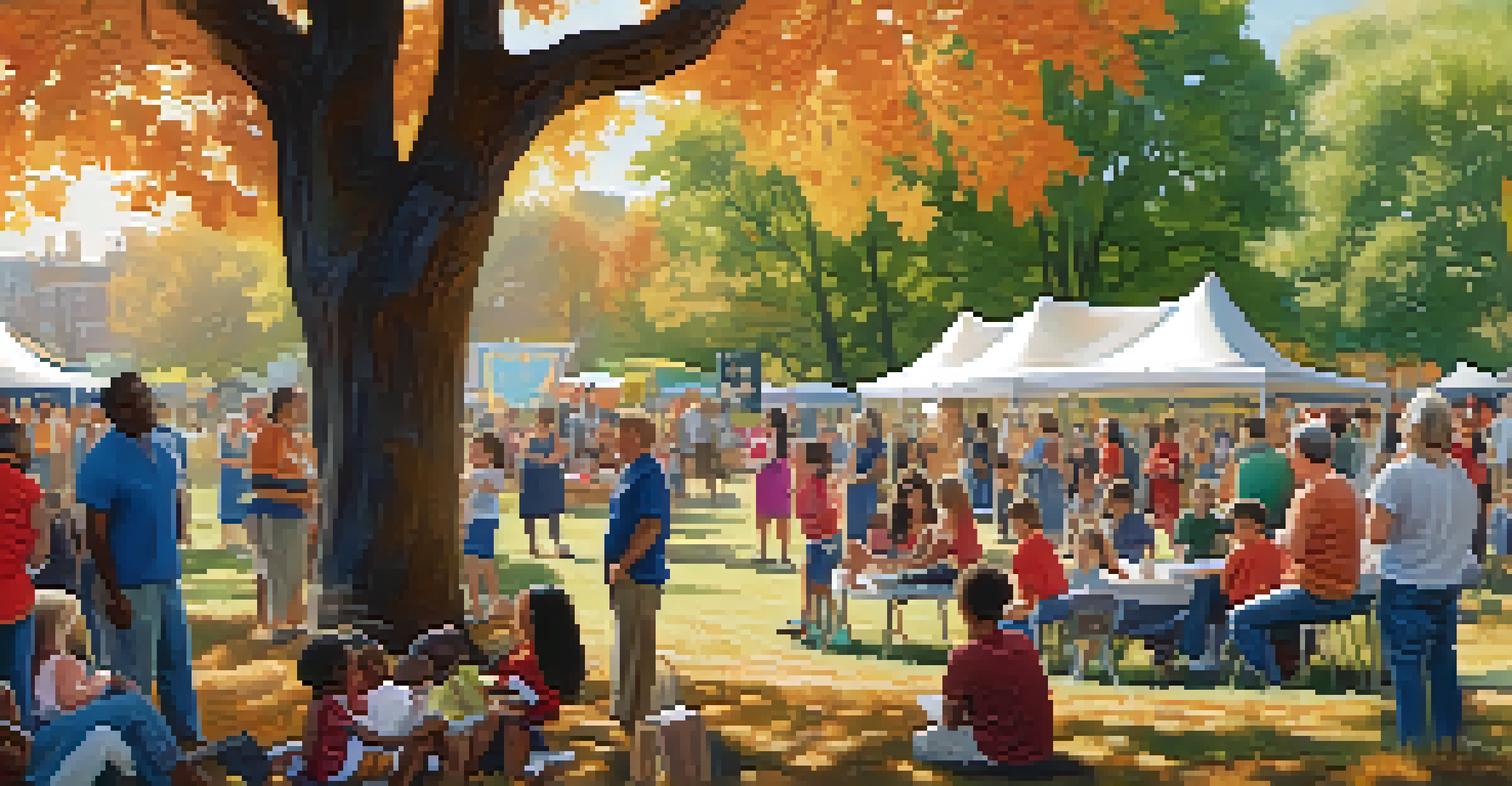Local Historical Events: Resources and Research Avenues

Understanding the Importance of Local History
Local history is more than just dates and events; it’s the story of our communities. Understanding these stories helps us connect with our roots, revealing how past events shape our present. For example, knowing about a town's founding can foster a sense of pride and identity among residents.
Those who cannot remember the past are condemned to repeat it.
Further, local history highlights the unique aspects of a community that often get overshadowed in national narratives. These stories can include everything from local heroes to significant events that may not have made it to textbooks. When we engage with local history, we celebrate our heritage while also learning valuable lessons.
Moreover, local history can inspire future generations, encouraging them to appreciate their surroundings and contribute positively to their communities. By sharing these stories, we create a sense of belonging and continuity that enriches our lives.
Key Resources for Local Historical Research
When diving into local historical research, the first stop is often the local library or historical society. These institutions typically house valuable archives, including newspapers, photographs, and manuscripts that provide a treasure trove of information. Many libraries now even offer digital collections for easy access.

Another excellent resource is state and local government websites, which often provide historical records and documents. For instance, you might find census data or land records that reveal interesting insights about your area’s past. These resources can be incredibly useful for genealogical research as well.
Local History Connects Communities
Understanding local history fosters pride and a sense of identity among residents.
Don’t forget about the power of community! Local history groups or online forums can connect you with passionate individuals who share your interest. Engaging with these communities can lead to discovering lesser-known stories and perhaps even collaborative research opportunities.
Utilizing Online Databases for Research
In today’s digital age, a wealth of information is just a click away. Websites like the National Archives and local historical databases offer searchable archives that can significantly enhance your research. This accessibility means you can uncover historical documents without ever leaving your home.
History is not a burden on the memory but an illumination of the soul.
Many universities also provide access to historical databases that the public can use. For example, JSTOR and Google Scholar host a range of academic articles that can help contextualize your findings. These platforms can be especially helpful if you're looking to understand the broader implications of local events.
Additionally, social media groups dedicated to local history can be great for crowdsourcing information. Engaging with these online communities can lead to discovering new resources or even personal stories tied to your research focus, enriching your understanding of local history.
Visiting Local Historical Sites and Museums
Nothing compares to the experience of visiting a local historical site or museum. These places often provide context that written resources cannot, such as guided tours, interactive exhibits, and knowledgeable staff. For example, a visit to a local battlefield can illuminate the significance of a historical event in a way that books might not.
Moreover, many museums host special events or lectures that can deepen your understanding of local history. These gatherings often feature local historians who share their expertise and personal anecdotes, making history come alive. Participating in such events can also foster connections with other history enthusiasts.
Explore Local Archives for Insights
Local archives provide vital documents and personal stories that enrich historical research.
Finally, consider volunteering at a local museum or historical site. Not only will you gain firsthand experience and knowledge, but you'll also contribute to preserving your community’s history. This hands-on experience can be incredibly rewarding and can spark new interests in lesser-known aspects of local history.
Connecting with Local Historians and Experts
Connecting with local historians can be a game-changer for your research. These experts often have a wealth of knowledge that goes beyond what you might find in books or online. Reaching out to them can lead to insightful discussions and potentially uncover sources you hadn't considered.
Many local historians conduct their research and might offer workshops or lectures to share their findings. Attending these events can provide you with new perspectives and a deeper appreciation for your community's history. Plus, it’s a great way to network and meet people who share your passion.
Don't hesitate to ask questions or seek guidance from these experts; they often enjoy sharing their knowledge. Whether you're working on a personal project or contributing to a community initiative, their insights can greatly enhance your understanding of local historical events.
Local Archives: A Hidden Gem for Researchers
Local archives are often underutilized but can be a goldmine for historical research. These facilities typically house documents such as birth and death records, property deeds, and other vital information. Taking the time to explore these archives can provide you with unique insights into local narratives.
Many archives also preserve oral histories and interviews, capturing personal stories that reflect the community's evolution. This firsthand perspective can add depth to your research, showcasing the human side of historical events. You might even discover recordings or transcripts that bring these stories to life.
Community Engagement Enhances Research
Involving residents in historical research uncovers unique perspectives and promotes collective heritage.
Before visiting, check to see if the archive has an online catalog or database. This can help you focus your visit and ensure you make the most of your time there. Engaging with local archives not only aids your research but also helps preserve important history for future generations.
Engaging the Community in Historical Research
Engaging the community can bring a new dimension to your historical research. Involving local residents often uncovers stories and perspectives that may not be documented anywhere. For instance, hosting a story-sharing event can encourage participants to share personal anecdotes related to local history.
Moreover, community involvement can foster a collective appreciation for local history. When people feel connected to their past, they are more likely to engage in preserving it. Collaborative projects, such as creating a local history website or organizing a walking tour, can energize the community and promote a shared sense of heritage.

Lastly, consider outreach programs that focus on local schools. Teaching students about their community’s history can instill pride and encourage them to become active participants in preserving that history. By making local history accessible and engaging, we can inspire future generations to continue exploring their roots.